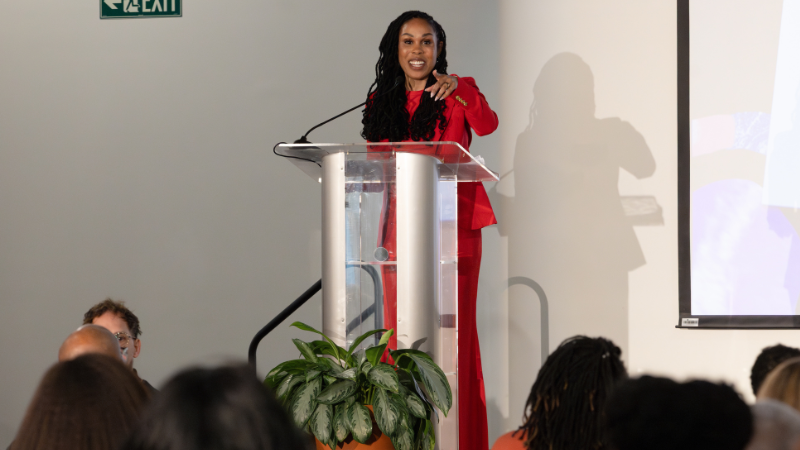Healthcare and Systemic Racism with Dr. Uché Blackstock

On the evening of April 9, after busy workdays ended, more than 70 local clinicians gathered in the Foundation’s Center for Health Equity to hear from Dr. Uché Blackstock about where health and racism intersect – and what they, as clinicians, can do to improve patient outcomes.
“We wanted to create a space for our local medical community to engage with a renowned industry expert around opportunities to elevate outcomes where we see the greatest need,” Foundation President and CEO Dr. Kanika Tomalin said. “Creating a community in which good health enables all people to thrive requires thoughtful reflection about where our systems fall short so that we can systemically improve them.”
Dr. Blackstock is a Harvard-trained physician, one of Time magazine’s 100 Most Influential People in Health, and the author of New York Times best-seller Legacy: A Black Physician Reckons with Racism in Medicine. She spoke to clinicians gathered lingering structural and historical inequities that impact outcomes as well as about strategies to better support Black patients and doctors.
The Foundation organized the clinician-only event with the groundbreaking leader believing that, while medical care is far from the only factor that shapes our health, clinicians have tremendous potential to improve patient outcomes and community well-being.
As a young girl growing up in Crown Heights, Brooklyn, Dr. Blackstock dreamed of following in her mother’s footsteps to become a doctor. In the fall of 2001, she took her place at Harvard Medical School (HMS), where her mother had also trained. While at HMS, she suffered a near-death experience that became foundational to her career.
Experiencing intense abdominal pain, nausea, and vomiting, she went to the ER seeking care. After a brief examination, she was told she had a stomach bug and sent home, her pain dismissed. After her symptoms worsened, she returned twice to the ER before finally receiving the correct diagnosis of appendicitis. By that time, however, her appendix had burst, causing complications and a long recovery.
“Part of the reason I have the career I have today–making sure patients are listened to, that they are given care that is responsive to their needs, and that physicians aren’t overlooking their pain simply because of the color of their skin–is due to that time spent as a patient, feeling vulnerable, scared, and unsure,” she writes in Legacy.
A former associate professor of emergency medicine at New York University, Blackstock is the CEO of Advancing Health Equity, which partners with organizations to eliminate bias and discrimination in healthcare, cultivate an equitable organizational culture, and improve health outcomes.
